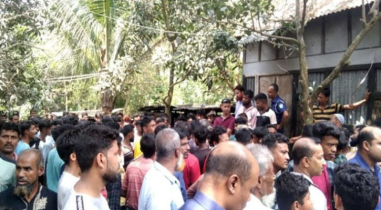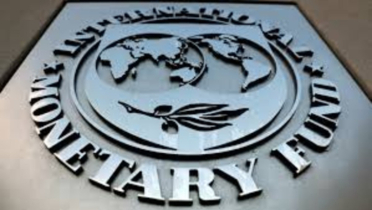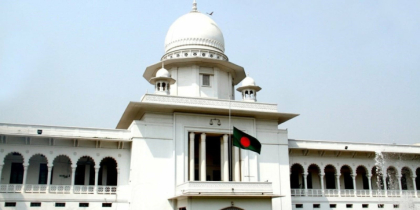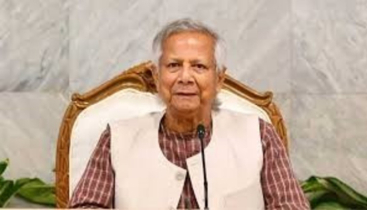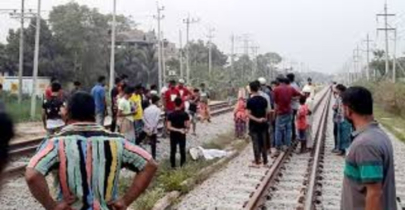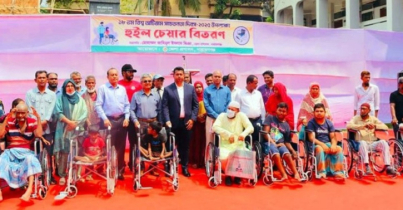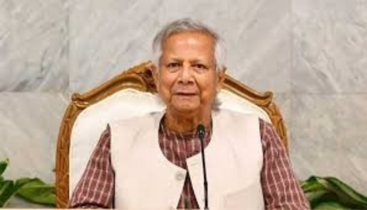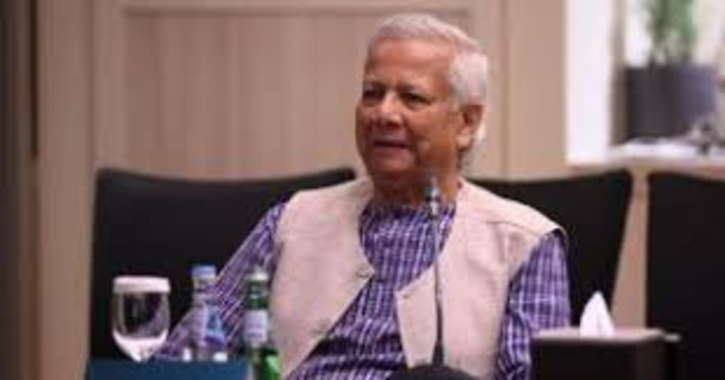
Given the renewed international geopolitical and geostrategic scenario, Chief Adviser Prof Muhammad Yunus on Wednesday said Qatar can strongly express their solidarity to resolve the Rohingya issue and be proactive to engage the OIC countries to raise more funds and impose pressure on the international community to advocate for the repatriation of the Rohingyas.
"Qatar can use its good offices to put pressure on Myanmar for starting repatriation of Rohingya people without any further delay," he said.
The Chief Adviser and Qatar Foundation Chief Executive Officer Sheikha Hind bint Hamad Al Thani, also the sister of Qatar Amir and the host of Earthna Summit, joined the high-level roundtable discussion on "Social and Environmental Challenges around Forcibly Displaced Populations: The Case of the Rohingyas."
Prof Yunus called for working together for humanity, for stability and for justice.
"Let us ensure that today’s discussion does not conclude with formalities alone, but marks the beginning of a meaningful partnership—one that keeps the Rohingya crisis at the forefront of our shared humanitarian priorities and works collectively towards lasting solutions," he said.
Prof Yunus said prolonged stay of the Rohingyas poses enormous challenges to Bangladesh and makes these Rohingyas frustrated.
He said the rise in criminal activities in the camps and attempts of illegal migration are clear signs of desperation among them. "If the problem persists further, it may affect the security and stability of the entire region and jeopardize development initiatives," Prof Yunus said.
Unfortunately, he said, international attention is gradually shifting from the Rohingya crisis due to various conflicts arising at different corners of the globe.
As of 19 March 2025, out of the data of a total of 8,29,036 submitted by the Bangladesh government, as many as 2,39,056 people were verified by the Myanmar government, and among them, 1,76,198 people were cleared as “Persons who resided in Myanmar” by the government of Myanmar.
Bangladesh is working with international and regional partners to resolve the Rohingya crisis by sustainable repatriation.
Prof Yunus said Bangladesh will organize a “High-Level Conference on the Situation of Rohingya Muslims and Other Minorities in Myanmar” under UN auspices, probably in September 2025 in New York.
Bangladesh expects high-level political participation and cooperation from Qatar in the conference.
Qatar was among the first few countries to immediately provide assistance and support after the outbreak of Rohingyas crisis in 2017.
Prof Yunus extended his sincere gratitude to the Qatar Foundation for organizing this gathering and for continuing to champion conversations that go beyond policy statements—conversations that strive for solutions, accountability, and solidarity.
Bangladesh is currently hosting about 1.3 million Forcibly Displaced Myanmar Nationals (Rohingya), while 32,000 newborns are being added yearly.
Despite numerous challenges and constraints, Prof Yunus said, Bangladesh is giving shelter to such a huge number of Rohingyas only on humanitarian considerations.
"Bangladesh considers sustainable repatriation as the only solution to the current crisis," he said.
Justice and Accountability
Chief Adviser Prof Yunus said ongoing justice and accountability initiatives in International Court of Justice (ICJ), the investigation of the International Criminal Court (ICC), and the activities of the Independent Investigative Mechanism for Myanmar (IIMM) regarding the atrocities committed against Rohingyas are very crucial.
Bangladesh as state party of UN and Rome Statute, he said, strongly believes crimes like genocide and crime against humanity should never go unpunished.
Attributing the crimes to Myanmar/officials of Myanmar will also be a crucial tool to build the confidence of Rohingyas for their repatriation to Rakhine, said the Chief Adviser.
Bangladesh is facilitating the accountability initiatives at the International Court of Justice (ICJ), the investigation of the International Criminal Court (ICC), and the activities of the Independent Investigative Mechanism for Myanmar (IIMM).
The case is expected to be in its merit phase by early 2025. Law firm Foley Hoag informed that after successful completion of the three phases (Provisional, Objection and Merit phases) of the Court proceedings, they would request the ICJ for reparation by the Myanmar government to the victims of the genocide.
The Gambian government is undertaking concerted efforts to secure necessary funding from OIC member states.
OIC has so far raised USD 2.77 million, with Bangladesh being the most significant contributor, worth USD 0.7 million.
Considering the severe budgetary constraints to meet up the expenditures of the ongoing judicial proceedings pending at the ICJ, Prof Yunus said, as an affluent member of the OIC, Qatar may be requested to make financial contribution to the OIC Fund for Rohingya, created to meet the expenditure of the case and to remain seized with the issue to maintain the momentum.

Recently, Prof Yunus said, the situation in Rakhine has undergone dramatic changes.
The Arakan Army (AA) now controls the 271-km Bangladesh-Myanmar Border and 14 of Rakhine’s 17 townships.
Due to Myanmar’s ongoing armed conflict, fresh arrivals of Rohingyas in Bangladesh since November 2023 crossed 100,000.
Since February 2024, being attacked by the Arakan Army (AA), 909 Myanmar security personnel have taken refuge inside Bangladesh of their own volition. Among them, 875 were repatriated to Myanmar, with another 34 to be repatriated soon.
Regrettably, Prof Yunus said, funding under the Joint Response Plan (JRP) for the Rohingya humanitarian crisis is decreasing.
For instance, he said, the 2024 JRP achieved 64.4% of its funding target, securing USD 548.9 million against an appeal of USD 852.4 million.
The 2025-26 Joint Response Plan (JRP) for the Rohingya Humanitarian Crisis was launched on 24 March 2025.
Between January 2025 to December 2025, the JRP requires $934.5 million for 1.48 million people, including the Rohingyas sheltered in Cox’s Bazar and Bhasan Char and also Bangladeshi host communities in Ukhiya and Teknaf.
Recently, the USA, the largest donor of the JRP, has cut foreign assistance, which is likely to exacerbate the existing precarious scenario of funding further.
Recently, huge concerns were raised when the WFP declared it would cut off food assistance for Rohingyas from April 2025.
Finally, the WFP could manage some immediate funding and avoid fund-cutting. However, the WFP informed that if adequate funding is not ensured, they will face a fund shortage again from September 2025.
Prof Yunus said Bangladesh is actively cooperating with the international community to maintain a continuous supply of funding. Qatar may come forward in this regard.
Foreign Affairs Adviser Md Touhid Hossain, Energy Adviser Fouzul Kabir Khan, National Security Adviser and High Representative to Chief Adviser Dr Khalilur Rahman, SDGs Affairs Principal Coordinator Lamiya Morshed, Bangladesh Ambassador to Qatar Md Nazrul Islam, among others, were present.
Sourse: UNB
TH

.png)
